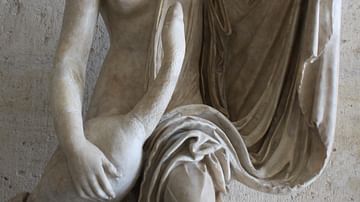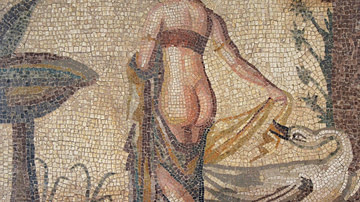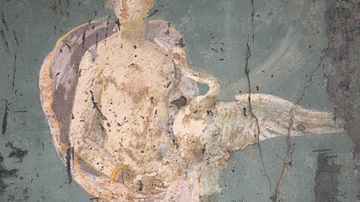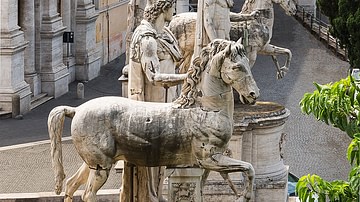Search
Remove Ads
Advertisement
Summary 
Loading AI-generated summary based on World History Encyclopedia articles ...
Search Results

Definition
Leda
Leda is a figure from Greek mythology who was famously seduced by Zeus when he took the form of a swan. She was a queen of Sparta and mother of beautiful Helen who sparked the Trojan War, and the Dioscuri twins. Leda and the swan was a popular...

Image
Leda & the Swan
A Roman-period statue of Leda and the swan from Greek mythology. From a 4th century BCE Greek original by Timotheos. (Capitoline Museums, Rome)

Image
Leda and the Swan
Mosaic depicting Leda and the Swan, once the central panel (emblema) of a mosaic floor discovered in the vicinity of the Sanctuary of Aphrodite at Palaipafos in Cyprus. Late 2nd - early 3rd century CE. (Palaepaphos Museum, Cyprus)

Image
Leda and the Swan Fresco from Stabiae
Roman fresco depicting Leda and the Swan. From Villa Arianna at Stabiae. Naples National Archaeological Museum. 1st century CE.

Image
Marble Figurine of Leda Avoiding the Swan
Attic table support, depicting Leda avoiding the swan, c. before 250 CE. Archaeological Museum of Thessaloniki, Greece. Founded c. 316 BCE and located at the heart of the Thermaic Gulf in the Aegean, the emporium city of Thessaloniki might...

Image
Dion Houses of Zosa and Leda, Greece
The Houses of Zosa and Leda in Dion in Macedonia (Greece) are two private houses were located in the southeastern corner of the ancient city. Only a narrow road separated them from the southern city wall. Both houses were built around the...

Definition
Castor and Pollux
Castor and Pollux (the Dioscuri) are figures from Greek and Roman mythology considered the twin sons of Zeus or Jupiter. Semi-divine figures, the twins were credited with the role of saving those in trouble at sea or in grave danger in war...

Article
A Visual Who's Who of Greek Mythology
Achilles The hero of the Trojan War, leader of the Myrmidons, slayer of Hector and Greece's greatest warrior, who sadly came unstuck when Paris sent a flying arrow guided by Apollo, which caught him in his only weak spot, his heel. Adonis...

Definition
Zeus
Zeus was the king of the 12 Olympian gods and the supreme god in Greek religion. Zeus is often referred to as the Father, as the god of thunder, and the 'cloud-gatherer'. Zeus controlled the weather and offered signs and omens. Zeus generally...

Definition
Greek Mythology
Greek mythology was used as a means to explain the environment in which humankind lived, the natural phenomena they witnessed and the passing of time through the days, months, and seasons. Greek myths were also intricately connected to religion...